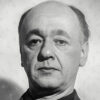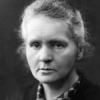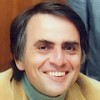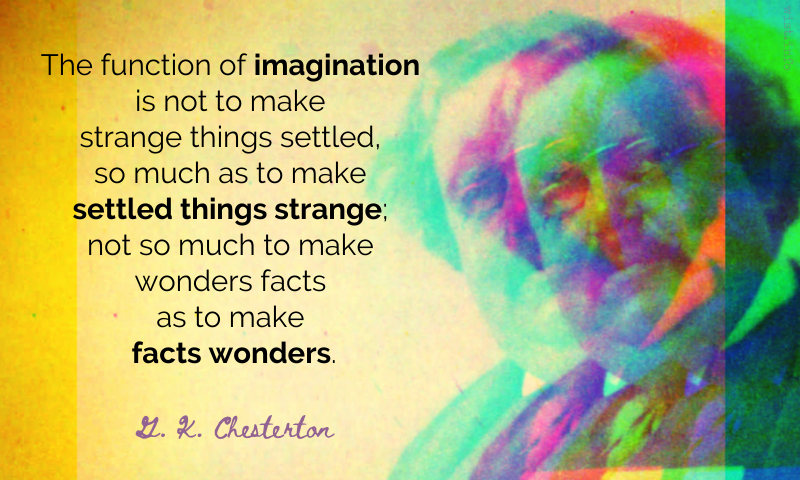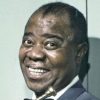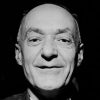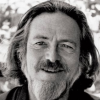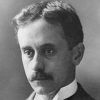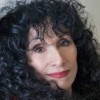Childhood is the world of miracle and wonder; as if creation rose, bathed in light out of the darkness, utterly new and fresh and astonishing. The end of childhood is when things cease to astonish us. When the world seems familiar, when one has got used to existence, one has become adult. The brave new world, the wonderland has grown trite and commonplace.
[L’enfance c’est le monde du miracle ou du merveilleux: c’est comme si la creation surgissait, lumineuse, de la nuit, toute neuve et toute fraîche, et tout étonnante. Il n’y a plus d’enfance à partir du moment où les choses ne sont plus étonnantes. Lorsque le monde vous semble «déja vu», lorsqu’on s’est habitué à l’existence, on devient adulte. Le monde de la féerie, la merveille neuve se fait banalité, cliché.]Eugène Ionesco (1912-1994) Romanian-French dramatist
Fragments of a Journal [Journal en Miettes], “The Crisis of Language” (1967) [tr. Stewart (1968)]
(Source)
Quotations about:
wonder
Note not all quotations have been tagged, so Search may find additional quotes on this topic.
To science, not even the bark of a tree or a drop of pond water is dull or a handful of dirt banal. They all arouse awe and wonder.
Jane Jacobs (1916-2006) American-Canadian journalist, author, urban theorist, activist
Dark Age Ahead, ch. 4 “Science Abandoned” (2004)
(Source)
I am among those who think that science has great beauty. A scientist in his laboratory is not only a technician: he is also a child placed before natural phenomena which impress him like a fairy tale. We should not allow it to be believed that all scientific progress can be reduced to mechanisms, machines, gearings, even though such machinery also has its beauty.
Marie Curie (1867-1934) Polish-French physicist and chemist [b. Maria Salomea Skłodowska]
“The Future of Culture [L’Avenir de la Culture]” conference, Madrid (1933-05-03/07)
(Source)
One of Curie's last public addresses. As quoted in Eve Curie Labouisse, Madame Curie: A Biography, ch. 24 (1937) [tr. Sheean (1938)].
Alternate translation:
I believe that science has great beauty. A scientist int he laboratory is not a mere technician; he is also a child confronting natural phenomena that impress him as though they were fairy tales. We should not allow it to believed that all scientific progress can be reduced to mechanisms, machines, and gearings, even though such machine also has beauty.
[Source]
But genius is nothing more nor less than childhood recovered at will — a childhood now equipped for self-expression with manhood’s capacities and a power of analysis which enables it to order the mass of raw material which it has involuntarily accumulated.
[Le génie n’est que l’enfance retrouvée à volonté, l’enfance douée maintenant, pour s’exprimer, d’organes virils et de l’esprit analytique qui lui permet d’ordonner la somme de matériaux involontairement amassée.]Charles Baudelaire (1821-1867) French poet, essayist, art critic
“Le Peintre de la Vie Moderne [The Painter of Modern Life],” sec. 3 (1863) [tr. Mayne (1964)]
(Source)
(Source (French)). Alternate translations:
But genius is simply childhood recovered at will, a childhood now equipped for self-expression, with mature faculties and an analytic spirit which permit him to set in order the mass of raw material he has involuntarily accumulated.
[tr. Kline (2020)]
Genius is only childhood recovered at will, childhood now gifted to express itself with the faculties of manhood and with the analytic mind that allows him to give order to the heap of unwittingly hoarded material.
[Source]
But genius is no more than childhood recaptured at will, childhood equipped now with man’s physical means to express itself, and with the analytical mind that enables it to bring order into the sum of experience, involuntarily amassed.
[Source]
Wonder is the basis of worship.
Thomas Carlyle (1795-1881) Scottish essayist and historian
Sartor Resartus, Book 1, ch. 10 (1831)
(Source)
Somewhere, something incredible is waiting to be known.
Carl Sagan (1934-1996) American scientist and writer
(Spurious)
The words come from a profile of Sagan, "Seeking Other Worlds," Newsweek (15 Aug 1977). The final paragraph reads:
“A serious search with negative results says something of profound importance,” Sagan argues. “We discover there’s something almost forbidden about life ... if it turns out we really are alone.” But clearly, Sagan is looking for a happier result. There may be no galumphing green Barsoomian giants to satisfy the fantasies of a romantic Brooklyn boy. But no doubt, there are even stranger discoveries to be made ... some totally new phenomenon perhaps ... Somewhere, something incredible is waiting to be known.
Those final words, not a quotation, have been broadly mistaken for an actual statement by Sagan.
Sharon Begley, one of the writers of the article, has confirmed the words are hers.
Sagan's daughter , Sasha Sagan, has also disavowed the quotation, noting that her father would never have used "incredible" in such a context, as the word literally means "not credible."
More discussion: Somewhere, Something Incredible Is Waiting To Be Known – Quote Investigator®.
For men are sprung from the earth not as its inhabitants and denizens, but to be as it were the spectators of things supernal and heavenly, in the contemplation whereof no other species of animals participates.
[Sunt enim ex terra homines non ut incolae atque habitatores sed quasi spectatores superarum rerum atque caelestium, quarum spectaculum ad nullum aliud genus animantium pertinet.]
Marcus Tullius Cicero (106-43 BC) Roman orator, statesman, philosopher
De Natura Deorum [On the Nature of the Gods], Book 2, ch. 56 / sec. 140 (2.140) (45 BC) [tr. Rackham (1933)]
(Source)
(Source (Latin)). Alternate translations:
For men are not simply to dwell here as inhabitants of the earth, but to be, as it were, spectators of the heavens and the stars, which is a privilege not granted to any other kind of animated beings.
[tr. Yonge (1877)]
For men are formed from the earth, not as its inhabitants and occupants, but as spectators of the things above them in the sky, the spectacle of which is afforded to no other race of animate beings.
[tr. Brooks (1896)]
The function of imagination is not to make strange things settled, so much as to make settled things strange; not so much to make wonders facts as to make facts wonders.
Gilbert Keith Chesterton (1874-1936) English journalist and writer
The Defendant, ch. 7 “A Defence of China Shepherdesses” (1901)
(Source)
Some of you young folks been saying to me, “Hey Pops, what you mean ‘What a wonderful world’? How about all them wars all over the place? You call them wonderful? And how about hunger and pollution? That ain’t so wonderful either.” Well how about listening to old Pops for a minute. Seems to me, it aint the world that’s so bad but what we’re doin’ to it. And all I’m saying is, see, what a wonderful world it would be if only we’d give it a chance. Love, baby, love. That’s the secret, yeah. If lots more of us loved each other, we’d solve lots more problems. And then this world would be a gasser. That’s wha’ ol’ Pops keeps saying.
Louis "Satchmo" Armstrong (1900-1971) American musician
Spoken introduction to “What a Wonderful World” (1970)
(Source)
A common fallacy in much of the adverse criticism to which science is subjected today is that it claims certainty, infallibility and complete emotional objectivity. It would be more nearly true to say that it is based upon wonder, adventure and hope.
Cyril Norman Hinshelwood (1897-1967) British chemist and Nobel laureate
“Classics among the intellectual disciplines,” Presidential Address to the Classical Association, Hull, UK (1959-04-09)
Quoted in the Sunday Times (1959-05-17), and in E. J. Bowen's obituary of Hinshelwood, in Chemistry in Britain, Vol. 3 (1967), p. 534.
The problem is that the philosopher of today has lost his wonder, because wonder, in modern philosophy, is something you must not have; it is like enthusiasm in eighteenth-century England — it is very bad form.
Alan Watts (1915-1973) Anglo-American philosopher, writer
“The Relevance of Oriental Philosophy” (c. 1964)
(Source)
Collected in Eastern Wisdom, Modern Life, ch. 6 (2006).
You see, a philosopher is a sort of intellectual yokel who gawks at things that sensible people take for granted.
Alan Watts (1915-1973) Anglo-American philosopher, writer
“The Relevance of Oriental Philosophy” (c. 1964)
(Source)
Collected in Eastern Wisdom, Modern Life, ch. 6 (2006). Variant: "A philosopher is a sort of intellectual yokel who gawks at things, like existence, that ordinary people take for granted."
“Miracles do not happen:” –‘t is plain sense,
If you italicize the present tense;
But in those days, as rare old Chaucer tells,
All Britain was fulfilled of miracles.
So, as I said, the great doors opened wide.
In rushed a blast of winter from outside,
And with it, galloping on the empty air,
A great green giant on a great green mare.Charlton Miner Lewis (1866-1923) American scholar of English literature, author
Gawayne and the Green Knight, Canto 1 (1903)
(Source)
I like handling newborn animals. Fallen into life from an unmappable world, they are the ultimate immigrants, full of wonder and confusion.
Diane Ackerman (b. 1948) American poet, author, naturalist
The Moon by Whale Light, ch. 4 “White Lanterns” (1991)
(Source)
Instructions for living a life:
Pay attention.
Be astonished.
Tell about it.
Keep some room in your heart for the unimaginable.
HAMLET: There are more things in heaven and earth, Horatio,
Than are dreamt of in your philosophy.William Shakespeare (1564-1616) English dramatist and poet
Hamlet, Act 1, sc. 5, l. 187ff (1.5.187-188) (c. 1600)
(Source)
“But do you really mean, sir,” said Peter, “that there could be other worlds — all over the place, just round the corner — like that?”
“Nothing is more probable,” said the Professor, taking off his spectacles and beginning to polish them, while he muttered to himself, “I wonder what they do teach them at these schools.”
What separates me from most atheists is a feeling of utter humility toward the unattainable secrets of the harmony of the cosmos. The fanatical atheists are like the slaves who are still feeling the weight of their chains which they have thrown off after hard struggle. They are creatures who — in their grudge against traditional religion as the “opium of the masses” — cannot hear the music of the spheres. I prefer the attitude of humility corresponding to the weakness of our intellectual understanding of nature and our own being. Science without religion is lame, religion without science is blind.
Albert Einstein (1879-1955) German-American physicist
(Spurious / Synthetic)
This quotation is actually a synthesis of several Einstein quotes. It is sometimes attributed as a whole to "Science, Philosophy and Religion, A Symposium" (1941), but only a part is found there. Nor is it found at all in the also sometimes cited "Religion and Science," New York Times Magazine (9 Nov 1930)
The "utter humility" portion is attributed as a letter from Einstein to Joseph Lewis (18 Apr 1953). It was quoted in Walter Isaacson, Einstein (2007). The “fanatical” through “spheres” portion is in a letter (7 Aug 1941) discussing responses to his essay “Science and Religion” (1941) per Max Jammer, Einstein and Religion: Physics and Theology (1999)
The “weakness of our intellectual understanding” phrase is attributed to a letter to Guy H. Raner Jr. (28 Sep 1949), quoted in the Isaacson work as well as by Michael R. Gilmore in Skeptic, Vol. 5, No. 2.
The lame/blind phrase is attributed to a letter to Eric Gutkind (3 Jan 1954). It was earlier used by Einstein (1941) at the Symposium cited above.
This synthetic quotation is a good example of the difficulties in quoting Einstein, who is used as a polemical bludgeon by a variety of groups, and is often poorly or incorrectly cited online, compounded by his re-use the same turns of phrase multiple times in his correspondence and papers.
The most beautiful thing we can experience is the mysterious. It is the source of all true art and science. He to whom this emotion is a stranger, who can no longer pause to wonder and stand rapt in awe, is as good as dead: his eyes are closed. This insight into the mystery of life, coupled though it may be with fear, has also given rise to religion. To know that what is impenetrable to us really exists, manifesting itself as the highest wisdom and the most radiant beauty which our dull faculties can comprehend only in their most primitive forms — this knowledge, this feeling, is at the center of true religiousness. In this sense, and in this sense only, I belong in the ranks of devoutly religious men.
Albert Einstein (1879-1955) German-American physicist
“What I Believe,” Forum and Century (Oct 1930)
(Source)
Einstein crafted and recrafted his credo multiple times in this period, and specifics are often muddled by differing translations and by his reuse of certain phrases in later writing. The Forum and Century entry appears to be the earliest. Some important variants:
The most beautiful experience we can have is the mysterious. It is the fundamental emotion that stands at the cradle of true art and true science. Whoever does not know it and can no longer wonder, no longer marvel, is as good as dead, and his eyes are dimmed. It was the experience of mystery -- even if mixed with fear -- that engendered religion. A knowledge of the existence of something we cannot penetrate, our perceptions of the profoundest reason and the most radiant beauty, which only in their most primitive forms are accessible to our minds: it is this knowledge and this emotion that constitute true religiosity. In this sense, and only this sense, I am a deeply religious man.
— "The World As I See It [Mein Weltbild]" [tr. Bargmann (1954)]
The fairest thing we can experience is the mysterious. It is the fundamental emotion which stands at the cradle of true art and true science. He who knows it not and can no longer wonder, no longer feel amazement, is as good as dead, a snuffed-out candle. It was the experience of mystery -- even if mixed with fear -- that engendered religion. A knowledge of the existence of something we cannot penetrate, of the manifestations of the profoundest reason and the most radiant beauty, which are only accessible to our reason in their most elementary forms -- it is this knowledge and this emotion that constitute the truly religious attitude; in this sense, and in this alone, I am a deeply religious man.
— "The World As I See It [Mein Weltbild]" [tr. Harris (1934)]
The most beautiful and deepest experience a man can have is the sense of the mysterious. It is the underlying principle of religion as well as all serious endeavor in art and science. He who never had this experience seems to me, if not dead, then at least blind. To sense that behind anything that can be experienced there is a something that our mind cannot grasp and whose beauty and sublimity reaches us only indirectly and as a feeble reflection, this is religiousness. In this sense I am religious.
[Das Schönste und Tiefste, was der Mensch erleben kann, ist das Gefühl des Geheimnisvollen. Es liegt der Religion sowie allem tieferen Streben in Kunst und Wissenschaft zugrunde. Wer dies nicht erlebt hat, erscheint mir, wenn nicht wie ein Toter, so doch wie ein Blinder. Zu empfinden, dass hinter dem Erlebbaren ein für unseren Geist Unerreichbares verborgen sei, dessen Schönheit und Erhabenheit uns nur mittelbar und in schwachem Widerschein erreicht, das ist Religiosität. In diesem Sinne bin ich religiös.]
— Variant in "My Credo [Mein Glaubensbekenntnis]" (Aug 1932)
See parallel sentiments here, here, and here.
Life is not meant to be easy, my child; but take courage — it can be delightful.
George Bernard Shaw (1856-1950) British playwright and critic
Back to Methuselah, Part 5 [The He-Ancient] (1921)
(Source)
Men go forth to marvel at the heights of mountains and the huge waves of the sea, the broad flow of the rivers, the vastness of the ocean, the orbits of the stars, and yet they neglect to marvel at themselves.
[Et eunt homines mirari alta montium et ingentes fluctus maris et latissimos lapsus fluminum et oceani ambitum et gyros siderum, et relinquunt se ipsos.]
Augustine of Hippo (354-430) Christian church father, philosopher, saint [b. Aurelius Augustinus]
Confessions, Book 10, ch. 8 / ¶ 15 (10.8.15) (c. AD 398) [tr. Outler (1955)]
(Source)
(Source (Latin)). Alternate translations:
And men go abroad to admire the heights of mountains, the mighty billows of the sea, the broad tides of rivers, the compass of the ocean, and the circuits of the stars, and pass themselves by.
[tr. Pusey (1838)]
And men go forth to wonder at the heights of mountains, the huge waves of the sea, the broad flow of the rivers, the extent of the ocean, and the courses of the stars, and omit to wonder at themselves.
[tr. Pilkington (1876)]
And men travel to admire the heights of mountains, and the vast waves of the sea, and the broad streams of rivers, and the circuit of the ocean, and the orbits of stars, and pass over themselves.
[tr. Hutchings (1890)]
Here are men going afar to marvel at the heights of mountains, the mighty waves of the sea, the long courses of great rivers, the vastness of the ocean, the movements of the stars, yet leaving themselves unnoticed.
[tr. Sheed (1943)]
Men go forth to marvel at the mountain heights, at huge waves in the sea, at the broad expanse of flowing rivers, at the wide reaches of the ocean, and at the circuits of the stars, but themselves they pass by.
[tr. Ryan (1960)]
Yet men go out and gaze in astonishment at high mountains, the huge waves of the sea, the broad reaches of rivers, the ocean that encircles the world, or the stars in their courses. But they pay no attention to themselves.
[tr. Pine-Coffin (1961)]
And men go abroad to wonder at the heights of mountains, the huge waves of the sea, the broad streams of rivers, the vastness of the ocean, the turnings of the stars -- and they do not notice themselves.
[tr. Warner (1963)]
Men go to wonder at the heights of mountains, and the huge billows of the sea, the broad sweeps of the rivers, the curve of ocean and the circuits of the stars, and yet pass by themselves.
[tr. Blaiklock (1983)]

